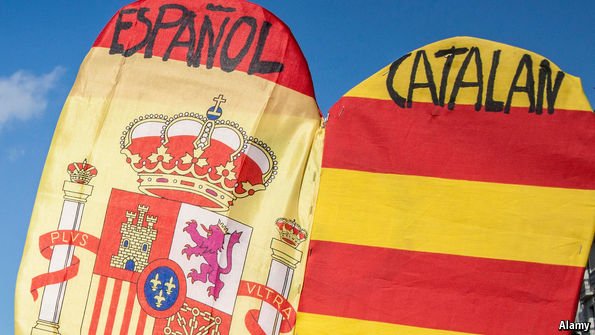Imagine if the European Union told the French that the primary language used in schools was to become English. Imagine if the Greeks were told that their mother tongue was to become a secondary, less prominent one, to an overarching, more homogenizing and less culturally relevant one.
In both of these hypothetical situations, there would be nothing short of public outrage and rejection. They would argue that the nation’s language is a pillar to upholding its culture. They would argue that an attack on their language is an attack on their history. In the Catalan case, there is one major difference between the hypotheticals of France or Greece: there is no nation state that defends their language from disappearing.
The French language has the security of being backed by the executive. In 1992, the French constitution was amended to state explicitly that "the language of the Republic is French." The issue for many Catalans is that the Spanish Constitution protects Castilian as the official language of the state and Part 2 and 3 of Article 3, which are supposed to protect ‘other Spanish languages’, have been interpreted with a seemingly biased-towards-Madrid lens in the Constitutional Court.
The story of the Catalan language over the last three centuries is one of resilience. In the 18th Century, Philip V ordered Spanish to be introduced into all aspects of Catalan society. Following the Spanish Civil War, Franco banned the Catalan language from being taught in schools and spoken in the street. Parents weren’t even allowed to give their children Catalan names. Franco’s goal was for Spain to have one culture and one language, Castilian. But the Catalan people fought to keep their language alive. Even during Franco’s dictatorship, Catalan was famously chanted at FC Barcelona matches, in the Abbey of Montserrat, or in secret at the family dinner table.
After the 40 year fascist dictatorship, Catalans could once again speak their mother tongue in public without the fear of persecution. In an effort to preserve the Catalan language, a language immersion policy was implemented to make Catalan the primary language in Catalan schools. But these efforts have historically come under attack by the likes of the conservative Partido Popular (People’s Party) who have in the past intervened in policy fields that fall exclusively under the Generalitat’s (Catalan Government) powers.
In 2003, the Generalitat aimed to strengthen Catalan self-rule in cooperation with the Spanish government through a reform to Catalonia’s Autonomy Statute in a new context of an España Plural (plural Spain). But Partido Popular lodged a constitutional complaint and the Constitutional Court revoked substantial parts of the new statute. One of the paramount struggles between the Spanish and Catalan governments was and is the protection of the Catalan language.
The Education Department, run out of Madrid, have threatened to challenge Catalan language immersion efforts through direct rule. Whilst Catalan is still the working tongue in classrooms, many feel that the attempts to silence their language directly threatens the preservation of Catalan culture. Many Catalans believe that sadly, their language is dying.
The typical rhetoric for those who want Spanish as the working tongue in classrooms is to ensure that Catalans do not ‘lose their Spanish’. But there are two important factors that debunk this argument. Firstly, Catalan is a minority language and therefore efforts must be made to protect it from being superseded by the majority language, not vice versa. Secondly, tests by the Ministry of Education showed that Catalans had the same or a better level of Spanish than the average student in Spain, despite being taught in Catalan.
The other reason voiced by those who oppose the language immersion policy is that parents should have the right to choose. But when the Education Department put in place a system where families could request schooling to be carried out in Spanish, less than 100 families per year did so, out of more than a million students.
Languages are not indifferent to each other. Each language is rich with their own unique indirect implications and nuance. The cultural history of a community is engraved into their language through expressions, birth names and surnames, jokes and even sounds and intonations.
To translate a book for example, requires a translator fluent in both languages, as to understand the implied meanings behind the words in context to the language and to reconstruct that meaning with different expressions, jokes, etc. That’s why authors pay professional translators rather than simply hit copy and paste on Google Translate… This is because each language has a culture of its own, or rather, cultures are conveyed in their languages.
If so much culture is passed down through generations and exchanged amongst members of a community through language, then it seems obvious that to preserve that culture, you must preserve the language. The Spanish government has been criticized for trying to indirectly dismantle Catalan solidarity via marketing campaigns that have categorized formally regarded Catalan-speaking regions with different names like Valencian or Mallorqui.
Although the regions do have minor linguistic differences, critics say that the Madrid government has exploited these differences in an effort to make the Catalan language seem less prevalent. This was the case when the Madrid government made a new language for a Catalan-speaking region between Lleida and Arago, La Franja.
The Catalan community is a resilient one that will no doubt continue to fight to keep the Catalan language alive. There are for example free Catalan lessons available for adults at the town halls of most cities in Catalonia. But what is crucial is for the domestic and international community to be aware that the direct and indirect attempts to supersede Catalan with Spanish have much graver cultural implications than solely linguistics.


